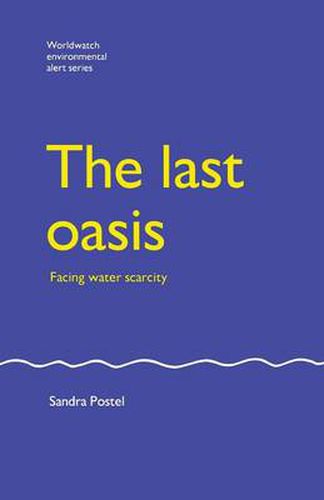Readings Newsletter
Become a Readings Member to make your shopping experience even easier.
Sign in or sign up for free!
You’re not far away from qualifying for FREE standard shipping within Australia
You’ve qualified for FREE standard shipping within Australia
The cart is loading…






For decades now we have wasted and mismanaged the world?s water supplies. Today, 27 countries are short of water, a quarter of the world?s population has no safe water, 46 per cent have no proper sanitation and each year four million children die of water-borne diseases. As most of the world?s major river systems cross several national boundaries, the scope disputes and the threat to international security is becoming more and more real.
In The Last Oasis, Sandra Postel examines the economic, ecological and political factors affecting fresh water supply. She confronts the issues of mismanagement and profligacy and analyses and dangers of confrontation, both between nations and between rural and urban users. She also emphasises that the technology and know-how for effective water husbandry does exist. With methods already in use, farmers could cut their demand for water by 40-90 per cent, and cities by one-third, without sacrificing economic output or quality of life.
Investing in water efficiency, recycling and conservation help meet rising demands and stave off disaster. But the priority is a common recognition of the gravity of the position, and with that a widespread push for institutions to manage sustainable use of water.
$9.00 standard shipping within Australia
FREE standard shipping within Australia for orders over $100.00
Express & International shipping calculated at checkout
For decades now we have wasted and mismanaged the world?s water supplies. Today, 27 countries are short of water, a quarter of the world?s population has no safe water, 46 per cent have no proper sanitation and each year four million children die of water-borne diseases. As most of the world?s major river systems cross several national boundaries, the scope disputes and the threat to international security is becoming more and more real.
In The Last Oasis, Sandra Postel examines the economic, ecological and political factors affecting fresh water supply. She confronts the issues of mismanagement and profligacy and analyses and dangers of confrontation, both between nations and between rural and urban users. She also emphasises that the technology and know-how for effective water husbandry does exist. With methods already in use, farmers could cut their demand for water by 40-90 per cent, and cities by one-third, without sacrificing economic output or quality of life.
Investing in water efficiency, recycling and conservation help meet rising demands and stave off disaster. But the priority is a common recognition of the gravity of the position, and with that a widespread push for institutions to manage sustainable use of water.